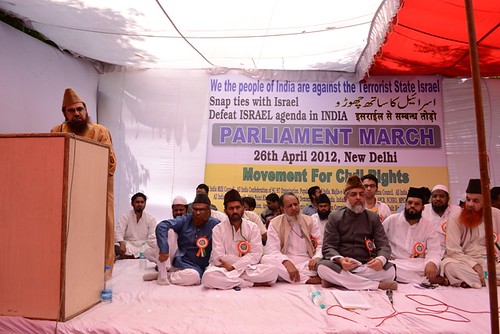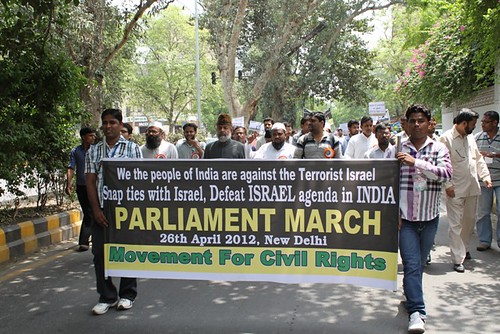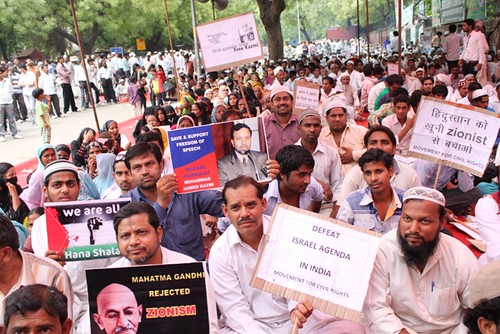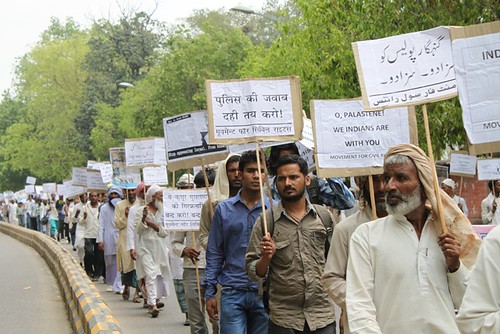http://twocircles.net/


Thousands march in Delhi against Israeli influence in India
Submitted by admin4 on 26 April 2012 - 9:41pm
By TCN News,
New Delhi: Thousands marched today to express their concern on the growing influence of Israel in India. The march was convened by Movement for Civil Rights, an alliance of many civil-society and religious organization under the leadership of Dr. Maulana Mufti Mukaram, Imam of Delhi’s Fatehpuri Masjid. The organizers asked the Indian government to snap all ties with Israel.
The marched started today from Ram Leela Maidan around 10 am and reached Jantar Mantar. Later a public meeting was held at Jantar mantar.

Mufti Mukarram addressing the gathering.
Mufti Mukaram while addressing the gathering said “Gandhiji was against Zionism and our first PM Nehru made India part of the Non-Aligned Movement but unfortunately, in early nineties this policy was changed drastically by the government led by P. V. Narasimha Rao who established formal diplomatic relations with Israel in 1991. Since then the country has become the largest customer of Israeli military equipments that are nothing but modified versions of US products. India is Israel's largest defence market, accounting for almost 50 percent of Israeli arms sales.”
Later on the Programme Convener and SDPI National Gen Secretary Hafiz Manzoor Ali Khan said that “That Israeli diplomats have established relations with various State Governments and this kind of relations are void and against the norms of our country.
Mossad have regularly intervened in investigations in various cases which indicate that Israel does not have trust in the capacity of Indian investigation agencies”.

EM Abdul Rahiman Chairman Popular Front of India said that “our growing civil and military ties with the illegitimate government of Israel are in gross violation of our great traditions and secular, democratic ethos.” He cautioned that engaging Israel agencies like Mossad in tackling our domestic law and order problems will ultimately endanger the very autonomy and dignity of our police, military and intelligence agencies. The recent incidents like the arrest of a senior journalist in the Israel embassy car blast are intended to suppress the voices against the Zionist atrocities. He stated that the terror agenda of Israel will get defeated in the Indian soil as a result of the united democratic resistance that is gaining strength in our country”.
Abdul Wahab Khilji President – All India Islahi movement said “ Israel has been always an entertainer of terrorism and was created by violence, And Israel relation with India with create tension in the nation as well it will a endorsement of the Israel’s oppression on Palestinian”.

Later in his speech Dalit leader Udit Raj of Confederation of SC ST Organisation said “it’s high time that an alliance should be formed between Dalit and Muslims and they should vote for themselves.”
Moulana Usman Baig president of All India Imams Council in his speech said that “the audio tapes seized from the laptop of Dayanand Pandey, an accused in various bomb blast cases carried out by Hindutva groups reveal that Col. Srikant Purohit, the king-pin of the terror group had sought the support of Israel. There are two reasons behind terrorism in India one is the Israel and the other is the fascist forces. It is also worth notice that the increasing ties with Israel had very grave impact on the country’s security”.

While addressing the public Turab Ali Kazmi son of arrested journalist Ahmed Kazmi said “that the only reason for arrest of his father is that he wrote the truth about America and Israel”.
National Secretary of National Confederation of Human Rights Organization Advocate A Mohamed Yusuf told “Israel is a cancer which is killing thousands of people, if we allow this cancer in our country it may lead to unhealthy situation.” Ahmed Kazmi was arrested on suspicion of supporting people who planted bomb in an Israeli diplomat car in New Delhi. He has been in detention since February.
Other people who addressed the public are:
Dr Baseer Ahmed Khan, President, Indian Union Muslim League
Maulana Amir Rashadi, President, Rastriya Ulama Council
Adv Bahar U Barqui, Advocate, Supreme Court
Zaheer Zaidi, President, Shia Point
Yasin Patel, Co-ordinator, Wahdet-e-Islami
Dr Anwar ul Islam, Secretary, AIMMM
Irfanullah Khan, Convener, Jamia Nagar Coordinator Committee
Dr Taslim Rahmani, President, NPCI
Faisal Khan, President, Khudai Khidmatgar
Adv A Mohamed Yusuf, Sec. NCHRO
Anisu Zaman, National President, Campus Front
A memorandum demanding severance of all ties with Israel was submitted to the Prime Minister of India by a team led by Hafiz Manzoor Ali Khan.
New Delhi: Thousands marched today to express their concern on the growing influence of Israel in India. The march was convened by Movement for Civil Rights, an alliance of many civil-society and religious organization under the leadership of Dr. Maulana Mufti Mukaram, Imam of Delhi’s Fatehpuri Masjid. The organizers asked the Indian government to snap all ties with Israel.
The marched started today from Ram Leela Maidan around 10 am and reached Jantar Mantar. Later a public meeting was held at Jantar mantar.

Mufti Mukarram addressing the gathering.
Mufti Mukaram while addressing the gathering said “Gandhiji was against Zionism and our first PM Nehru made India part of the Non-Aligned Movement but unfortunately, in early nineties this policy was changed drastically by the government led by P. V. Narasimha Rao who established formal diplomatic relations with Israel in 1991. Since then the country has become the largest customer of Israeli military equipments that are nothing but modified versions of US products. India is Israel's largest defence market, accounting for almost 50 percent of Israeli arms sales.”
Later on the Programme Convener and SDPI National Gen Secretary Hafiz Manzoor Ali Khan said that “That Israeli diplomats have established relations with various State Governments and this kind of relations are void and against the norms of our country.
Mossad have regularly intervened in investigations in various cases which indicate that Israel does not have trust in the capacity of Indian investigation agencies”.

EM Abdul Rahiman Chairman Popular Front of India said that “our growing civil and military ties with the illegitimate government of Israel are in gross violation of our great traditions and secular, democratic ethos.” He cautioned that engaging Israel agencies like Mossad in tackling our domestic law and order problems will ultimately endanger the very autonomy and dignity of our police, military and intelligence agencies. The recent incidents like the arrest of a senior journalist in the Israel embassy car blast are intended to suppress the voices against the Zionist atrocities. He stated that the terror agenda of Israel will get defeated in the Indian soil as a result of the united democratic resistance that is gaining strength in our country”.
Abdul Wahab Khilji President – All India Islahi movement said “ Israel has been always an entertainer of terrorism and was created by violence, And Israel relation with India with create tension in the nation as well it will a endorsement of the Israel’s oppression on Palestinian”.

Later in his speech Dalit leader Udit Raj of Confederation of SC ST Organisation said “it’s high time that an alliance should be formed between Dalit and Muslims and they should vote for themselves.”
Moulana Usman Baig president of All India Imams Council in his speech said that “the audio tapes seized from the laptop of Dayanand Pandey, an accused in various bomb blast cases carried out by Hindutva groups reveal that Col. Srikant Purohit, the king-pin of the terror group had sought the support of Israel. There are two reasons behind terrorism in India one is the Israel and the other is the fascist forces. It is also worth notice that the increasing ties with Israel had very grave impact on the country’s security”.

While addressing the public Turab Ali Kazmi son of arrested journalist Ahmed Kazmi said “that the only reason for arrest of his father is that he wrote the truth about America and Israel”.
National Secretary of National Confederation of Human Rights Organization Advocate A Mohamed Yusuf told “Israel is a cancer which is killing thousands of people, if we allow this cancer in our country it may lead to unhealthy situation.” Ahmed Kazmi was arrested on suspicion of supporting people who planted bomb in an Israeli diplomat car in New Delhi. He has been in detention since February.
Other people who addressed the public are:
Dr Baseer Ahmed Khan, President, Indian Union Muslim League
Maulana Amir Rashadi, President, Rastriya Ulama Council
Adv Bahar U Barqui, Advocate, Supreme Court
Zaheer Zaidi, President, Shia Point
Yasin Patel, Co-ordinator, Wahdet-e-Islami
Dr Anwar ul Islam, Secretary, AIMMM
Irfanullah Khan, Convener, Jamia Nagar Coordinator Committee
Dr Taslim Rahmani, President, NPCI
Faisal Khan, President, Khudai Khidmatgar
Adv A Mohamed Yusuf, Sec. NCHRO
Anisu Zaman, National President, Campus Front
A memorandum demanding severance of all ties with Israel was submitted to the Prime Minister of India by a team led by Hafiz Manzoor Ali Khan.
